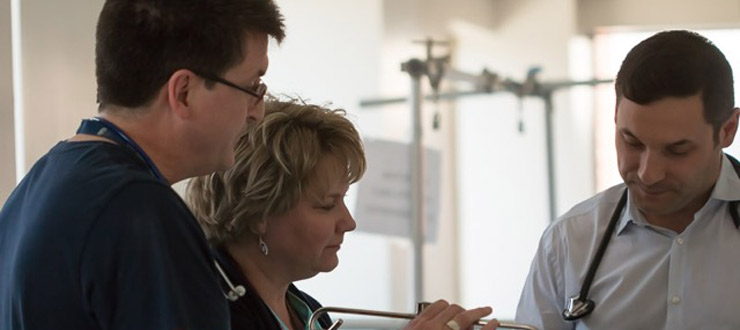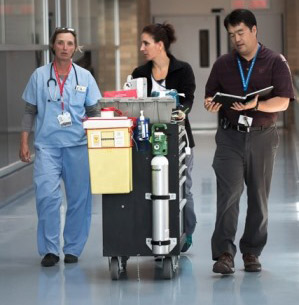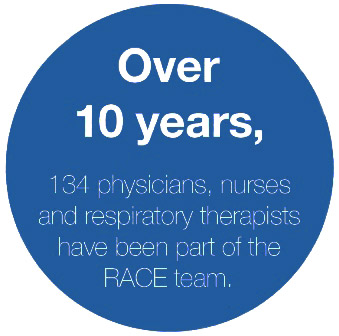
Respiratory Therapist Graham Morrison (left), RN Karen Leblanc and Dr. Mike Hartwick have provided critical care to patients, visitors and staff in crisis in every corner of The Ottawa Hospital. Photo by Michelle Dickie.
What do you do when a patient’s condition is deteriorating quickly or when someone in the hospital lobby looks like they might be having a heart attack? What if a patient’s daughter really isn’t sure what a transfer to the ICU will mean for her mother?
You call in the experts: the Rapid Assessment of Critical Events – or RACE – team, a group of intensive care experts who respond quickly and skilfully to in-hospital crises.
Ten years after its creation, the “ICU on wheels” has become an integral part of The Ottawa Hospital. Composed of an Intensive Care Unit doctor, an ICU nurse and a respiratory therapist, the team has provided critical care to patients, visitors and staff in crisis in every corner of the hospital.
The team was founded to support inpatient units when a patient began to show warning signs of worsening illness or cardiac arrest but, over the years, the team has evolved to support other roles in patient care as well. One of these roles, said General Campus team lead Dr. Michael Hartwick, is that RACE team members will counsel patients and families about intensive care.
“We started noticing that the RACE team had a real role in speaking with patients and families about their goals and values, and what the ICU really could offer,” he said. “Our role is initially to resuscitate – we also recognize there is a role for us to play in discussing whether the resuscitation is a good idea.”

Registered Nurse Sue Guillemette (left), Respiratory Therapist Luce Gougeon and Dr. John Kim discuss a case on the way to a call. Photo by Michelle Dickie.
Because staff members on units know to call the RACE team when they see warning signs, Dr. Hartwick said, he feels the team has made a big difference to patients over the years, lowering the number of cardiac arrests at the hospital and stabilizing patients on the unit or quickly moving them to the ICU. In the next few days, the RACE team then follows up with patients to make sure their condition isn’t worsening again.
The team works closely with staff on inpatient units so that they can better understand each patient’s history and care plan. In turn, RACE team members help unit staff develop skills so that they’re more comfortable providing critical care on the unit.
“It can be a bad feeling if things aren’t going well, so we’re there to support the unit staff,” Dr. Hartwick said. “They can get help and work with us to take care of their patient.”

Many viewpoints and collaboration are keys to RACE team success
When the RACE team responds to a call from a unit, having health-care providers from three different professions on the team is invaluable, said Dr. Hartwick.
“As much as we all try to be on the same page, professions tend to communicate differently,” he said. “Between the three of us, we can communicate more effectively with teams on the floor during a crisis.”
Having three highly-trained people with different ideas and perspectives in the room helps the team to consider many different sides of the patient’s care, said Dr. Hartwick.
“We all see things through a different lens, and that’s a benefit to the team,” he said. “This doesn’t work well in isolation. We need to collaborate with the units and with each other.”

Support patient care and research at
The Ottawa Hospital


 To reset, hold the Ctrl key, then press 0.
To reset, hold the Ctrl key, then press 0.